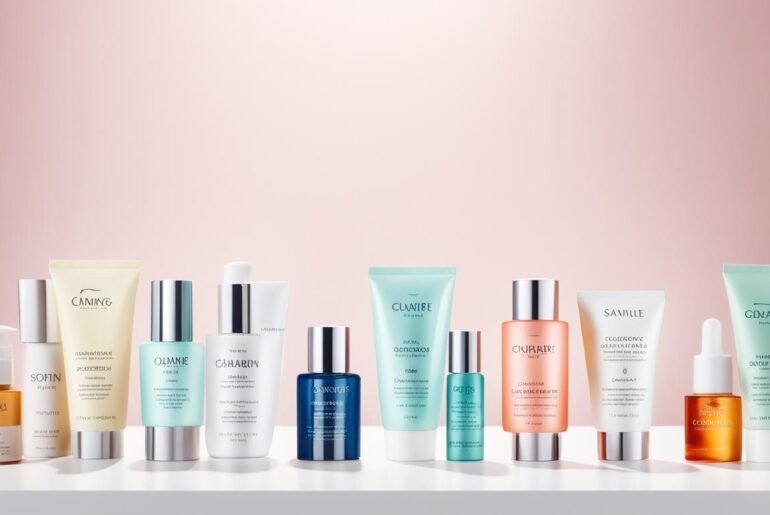Did you know that incorporating antioxidants into your skincare routine can significantly improve the condition of your skin and help prevent signs of aging? It’s true! Antioxidants play a crucial role in anti-aging skin treatments by counteracting damaging free radicals and oxidative stress. Research suggests that these powerful compounds can rejuvenate your skin, reducing the appearance of fine lines, wrinkles, and promoting a youthful complexion.
Key Takeaways:
- Antioxidants are essential for maintaining youthful skin and preventing signs of aging.
- Incorporating natural skincare products rich in antioxidants can provide numerous benefits for your skin.
- Antioxidants can counteract free radicals and oxidative stress, reducing the appearance of fine lines and wrinkles.
- Research supports the use of antioxidants in skincare routines for improved skin health and a more youthful complexion.
- Stay tuned to discover the best antioxidants and how to incorporate them into your anti-aging skincare regimen.
The Role of Antioxidants in Skin Health
Antioxidants play a vital role in maintaining skin health. They help protect the skin from harmful UV radiation, which can accelerate skin aging. By incorporating antioxidants into skincare routines, individuals can promote healthier, younger-looking skin.
Protection against UV Radiation
UV radiation from the sun can cause significant damage to the skin, leading to premature aging, wrinkles, and pigmentation. Antioxidants act as a shield, helping to neutralize the harmful effects of UV rays on the skin. They reduce DNA damage, protecting skin cells from the negative impact of UV radiation.
Reducing Wrinkles and Pigmentation
Antioxidants have been shown to improve skin texture by reducing the appearance of wrinkles and pigmentation. They boost collagen production, a protein that gives skin its elasticity, and stimulate elastin production, which helps maintain skin resilience. This results in a smoother, more youthful complexion.
Hydration and Healing Processes
Antioxidants aid in improving skin hydration by promoting the production of healthy skin cells and retaining moisture. They support the skin’s healing processes, helping to reduce inflammation and redness caused by various skin conditions.
“Antioxidants play a crucial role in maintaining skin health by protecting against UV radiation, reducing wrinkles and pigmentation, and supporting hydration and the skin’s healing processes.”
By incorporating antioxidant-rich skincare products into daily routines and adopting a healthy lifestyle, individuals can optimize their skin health and achieve a radiant, youthful complexion.
Types of Antioxidants for Skin Care

When it comes to taking care of your skin, antioxidants play a crucial role. These powerful compounds help protect your skin from damage caused by free radicals and oxidative stress, keeping it healthy and youthful. In this section, we will explore the different types of antioxidants that are beneficial for your skin, including prominent examples such as vitamins A, C, and E, as well as selenium, zinc, carotenoids, flavonoids, and glutathione.
Vitamins A, C, and E: These vitamins are widely recognized for their antioxidant properties and are commonly found in skincare products. Vitamin A aids in collagen production, promotes cell turnover, and helps reduce the appearance of wrinkles. Vitamin C brightens the skin, evens out skin tone, and protects against sun damage. Vitamin E moisturizes, repairs skin, and acts as a natural barrier against environmental pollutants and UV radiation.
Selenium and Zinc: These minerals have antioxidant effects that can help maintain the health of your skin. Selenium helps protect against sun damage and plays a crucial role in skin elasticity, while zinc aids in wound healing, reduces inflammation, and supports collagen production.
Carotenoids: Found in fruits and vegetables with vibrant colors, carotenoids are known for their antioxidant properties. They help neutralize free radicals, improve skin hydration, and promote a radiant complexion. Some common carotenoids include beta-carotene, lycopene, and lutein.
Flavonoids: These plant-based compounds have powerful antioxidant and anti-inflammatory properties. When applied topically or consumed through a healthy diet, flavonoids can help protect the skin from damage caused by UV radiation, reduce redness, and improve skin elasticity. Examples of flavonoids include quercetin, catechins, and anthocyanins.
Glutathione: Known as the body’s master antioxidant, glutathione plays a vital role in protecting the skin from oxidative stress. It helps neutralize free radicals, detoxifies the body, and supports overall skin health.
By incorporating skincare products or a diet rich in these antioxidants, you can provide your skin with the nourishment it needs for optimal health and radiance.
When choosing skincare products, look for those that contain these antioxidant-rich ingredients. Remember, a combination of antioxidants can provide even greater benefits for your skin. Now that we’ve explored the different types of antioxidants, let’s delve into the various skincare products available that incorporate these powerful compounds.
Skin Care Products with Antioxidants
When it comes to skincare products, antioxidants are often a key ingredient. These powerful compounds can provide numerous benefits for maintaining healthy and youthful-looking skin. Let’s explore some popular antioxidant-rich ingredients and important factors to consider when choosing skincare products.
Retinoids
Retinoids are a type of vitamin A derivative that are known for their anti-aging properties. They can help reduce the appearance of fine lines and wrinkles, improve skin texture, and promote cell turnover. Retinoids are commonly found in anti-aging creams and serums.
Vitamin C
Vitamin C is a potent antioxidant that can brighten the skin, fade dark spots and hyperpigmentation, and protect against environmental damage. Skincare products containing vitamin C are often used to achieve a more radiant complexion.
Vitamin E
Vitamin E is another powerful antioxidant that can help protect the skin from free radicals and reduce inflammation. It is often used in moisturizers, serums, and sunscreens to nourish and hydrate the skin.
When choosing skincare products with antioxidants, it is important to consider your individual skin type and any allergies or sensitivities you may have. Some antioxidants, like retinoids, can cause dryness or irritation for certain individuals. It is always recommended to perform a patch test before trying out new products.
Additionally, when using retinoid products, it is crucial to use sunscreen daily. Retinoids can make the skin more sensitive to sun damage, so protecting your skin with a broad-spectrum sunscreen can help prevent further skin damage.
“Choosing the right skincare products with antioxidants can make a significant difference in the health and appearance of your skin.”
By incorporating antioxidant-rich skincare products into your daily routine, you can harness the power of these compounds to promote healthy and youthful-looking skin.
| Antioxidant-rich Skincare Products | Benefits |
|---|---|
| Retinoids | Reduces the appearance of fine lines and wrinkles, improves skin texture, promotes cell turnover |
| Vitamin C | Brightens the skin, fades dark spots and hyperpigmentation, protects against environmental damage |
| Vitamin E | Protects the skin from free radicals, reduces inflammation, nourishes and hydrates the skin |
Importance of a Healthy Diet for Skin Health

A healthy and varied diet is crucial for maintaining skin health. Consuming a diet rich in antioxidants provides the necessary nutrients to support the skin and promote its overall well-being. Antioxidants can help protect the skin from oxidative stress caused by environmental factors, such as sun exposure and pollution.
One of the key ways to incorporate antioxidants into your diet is by consuming a wide variety of fruits, vegetables, berries, coffee, green tea, and cacao. These foods are known for their high antioxidant content, which can benefit the skin by reducing inflammation, supporting collagen production, and improving skin elasticity.
Here is a breakdown of some antioxidant-rich foods that are beneficial for skin health:
| Foods | Antioxidants |
|---|---|
| Blueberries | Anthocyanins |
| Spinach | Vitamin C, Vitamin E, Beta-carotene |
| Tomatoes | Lycopene |
| Green tea | Epigallocatechin gallate (EGCG) |
| Dark chocolate | Flavonoids |
Incorporating these antioxidant-rich foods into a well-balanced diet can have a positive impact on skin health. However, it’s important to note that a healthy diet alone is not enough to address all skin concerns. It should be combined with a consistent skincare routine and other healthy lifestyle choices, such as staying hydrated and getting regular exercise.
Potential Benefits of Antioxidants for Skin Conditions
Antioxidants play a multifaceted role in skincare, and their potential benefits extend beyond just anti-aging. Studies have highlighted the correlation between lower levels of vitamin E and various skin conditions, including vitiligo, atopic dermatitis, and acne. While further research is needed to determine the full potential of antioxidants, specifically vitamin E, in improving these skin conditions, incorporating antioxidants into skincare routines may offer additional benefits for individuals seeking relief from specific skin concerns.
“Antioxidants have demonstrated promising effects on overall skin health and are worth considering as part of a comprehensive skincare regimen.” – Dr. Katherine Johnson, Dermatologist
Antioxidants help neutralize harmful free radicals and combat oxidative stress, which can contribute to the development and progression of skin conditions. By incorporating antioxidant-rich skincare products and foods into your routine, you may nourish your skin from within and externally, potentially improving the overall condition of your skin.
To better understand the potential benefits of antioxidants for skin conditions, let’s explore some of the key skin conditions in more detail:
1. Vitiligo
Vitiligo is a skin condition characterized by the loss of skin pigmentation, leading to the formation of patchy white spots on the skin. While the exact cause of vitiligo is unknown, studies have indicated a potential association between lower levels of vitamin E and the development or progression of vitiligo. Vitamin E’s antioxidant properties may help protect melanocytes, the cells responsible for producing skin pigment, from oxidative damage, thereby potentially slowing the progression of the condition.
2. Atopic Dermatitis
Atopic dermatitis, also known as eczema, is a chronic inflammatory skin condition that causes itchy, red, and dry skin patches. While the exact cause of atopic dermatitis is complex and multifactorial, studies suggest that oxidative stress and inflammation play a role in the development and exacerbation of the condition. Antioxidants, such as vitamin E, can help reduce oxidative stress and inflammation, potentially soothing and improving the symptoms of atopic dermatitis.
3. Acne
Acne is a common skin condition characterized by the presence of pimples, blackheads, whiteheads, and inflammation. Oxidative stress and inflammation contribute to the development of acne. Antioxidants, such as vitamin E, can help neutralize free radicals and reduce inflammation, potentially aiding in the management of acne. However, the efficacy of antioxidants for acne treatment may vary among individuals, and it is essential to consult a dermatologist for appropriate skincare recommendations.
I recommend incorporating antioxidants, such as vitamin E-rich foods (e.g., nuts, seeds, leafy greens) and antioxidant-rich skincare products, into your routine to potentially improve skin conditions. Remember to consult with a dermatologist for personalized advice tailored to your specific needs.
Further research is necessary to fully understand the mechanisms through which antioxidants, including vitamin E, impact these skin conditions. However, their potential benefits make them a worthwhile consideration for individuals seeking relief from vitiligo, atopic dermatitis, and acne.
| Antioxidant | Potential Benefits | Sources |
|---|---|---|
| Vitamin E | Potential protection against oxidative damage, slowing the progression of skin conditions | Nuts, seeds, leafy greens, vegetable oils |
| Vitamin C | Assists in collagen production and promotes wound healing | Citrus fruits, berries, bell peppers, broccoli |
| Selenium | Helps protect the skin against UV-induced damage | Brazil nuts, seafood, whole grains |
| Zinc | Promotes skin healing and may reduce inflammation | Shellfish, legumes, seeds |
Table: Key antioxidants and their potential benefits for skin conditions. Incorporate these antioxidants into your diet through various food sources for overall skin health.
Role of Antioxidants in Sun Protection

When it comes to sun protection, applying sunscreen is a must. However, did you know that incorporating antioxidants into your skincare routine can provide additional benefits for protecting your skin from sun damage?
UV radiation from the sun can have harmful effects on the skin, including accelerating the aging process. But how exactly do antioxidants help?
Antioxidants help protect the skin from the oxidative stress caused by UV radiation. They work by neutralizing free radicals, which are unstable molecules that can cause damage to skin cells. By reducing oxidative stress and minimizing the impact of free radicals, antioxidants can help safeguard your skin from the harmful effects of the sun.
Not only do antioxidants provide an extra layer of defense against sun damage, but they also offer other benefits for the skin. They can help improve skin hydration, reduce inflammation, and support the skin’s natural healing processes.
“Incorporating antioxidants into your skincare routine can provide additional benefits for protecting your skin from sun damage.”
So, how can you incorporate antioxidants into your skincare routine? Look for skincare products that contain antioxidant-rich ingredients such as vitamin C, vitamin E, and green tea extract. These ingredients can provide powerful antioxidants that help protect and nourish your skin.
The Benefits of Antioxidants in Sun Protection:
- Protect the skin from harmful effects of UV radiation
- Reduce oxidative stress and neutralize free radicals
- Improve skin hydration
- Support the skin’s natural healing processes
Remember, while antioxidants are beneficial for sun protection, they should not replace sunscreen. Applying a broad-spectrum sunscreen with a high SPF is still essential for comprehensive sun protection. By combining sunscreen and antioxidants in your skincare routine, you can enhance your skin’s defense against sun damage and maintain a healthy, youthful complexion.
Topical and Oral Antioxidant Supplements

Antioxidant supplements offer both topical and oral options for individuals looking to enhance their skincare routine. Topical application of antioxidant-rich formulations, such as those containing vitamin C, can provide significant anti-aging and anti-pigmentation benefits when applied directly to the skin. These supplements can help reduce the appearance of fine lines and wrinkles, improve skin tone, and promote a more youthful complexion.
When it comes to oral supplementation, the efficacy of antioxidant supplements in improving overall skin health can vary. While some studies suggest that oral antioxidants may help support skin health from within, the results are not consistent across the board. Different antioxidants may have varying levels of bioavailability and effectiveness when taken orally.
It’s important to note that prolonged use of high-dose antioxidant supplements may have potential drawbacks. Some studies have raised concerns about the potential for excessive antioxidant intake, which may disrupt the delicate balance of oxidative processes in the body. Additionally, certain individuals may experience adverse effects or interactions with medication, highlighting the importance of consulting with a healthcare professional before starting any new supplement regimen.
Ultimately, the decision to incorporate antioxidant supplements into your skincare routine should be based on individual needs and preferences. While topical application of antioxidants has been shown to provide visible benefits, the effectiveness of oral supplementation may vary. It’s essential to consider factors such as personal health history, potential drug interactions, and overall dietary intake when considering the use of antioxidant supplements.
| Pros of Topical Antioxidant Supplements | Cons of Topical Antioxidant Supplements |
|---|---|
| 1. Anti-aging and anti-pigmentation properties | 1. Limited penetration into deep skin layers |
| 2. Visible improvements in skin tone and texture | 2. Potential sensitivity or irritation for some individuals |
| 3. Convenient and easy to incorporate into skincare routine | 3. Need for continued and consistent use for optimal results |
Table: Pros and Cons of Topical Antioxidant Supplements
When considering oral antioxidant supplements, it’s important to weigh both the potential benefits and drawbacks. Here are some key points to consider:
- Oral supplements may support overall skin health, but results can vary.
- The effectiveness of oral antioxidants depends on factors such as bioavailability and individual response.
- Prolonged use of high-dose antioxidant supplements may disrupt the natural balance of oxidative processes in the body.
- Consulting with a healthcare professional is crucial to ensure safety and minimize the risk of adverse effects or interactions with medications.
Overall, while topical antioxidant supplements have demonstrated visible benefits for skin health, the efficacy of oral supplementation may vary. It’s important to make informed decisions based on individual needs, concerns, and medical history. Consulting with a healthcare professional can provide personalized guidance and ensure the safe and effective use of antioxidant supplements for optimum skin health.
The Need for Further Research
While antioxidants have shown promising benefits for skin health, there is still a need for further research to fully understand their mechanisms of action and their specific effects on different skin conditions. Scientific studies investigating the skin benefits of antioxidants continue to provide valuable insights into the use of these compounds for maintaining healthy, youthful-looking skin.
Research on antioxidants plays a crucial role in advancing our knowledge of their potential in skincare. By conducting rigorous scientific studies, researchers can explore the efficacy and safety of specific antioxidants, as well as their optimal use for different skin conditions. These studies help us better understand which antioxidants are most effective in promoting skin health and which individuals may benefit the most from their use.
The Benefits of Scientific Studies on Antioxidants in Skincare
Scientific studies enable us to unravel the complex interactions between antioxidants and skin health. By examining the effects of antioxidants on various skin conditions, we can determine their potential benefits for specific concerns such as acne, pigmentation, or uneven skin tone. This research helps us identify the most appropriate antioxidants and formulation methods to target specific skin concerns effectively.
Scientific studies investigating the skin benefits of antioxidants continue to provide valuable insights into the use of these compounds for maintaining healthy, youthful-looking skin.
Furthermore, research allows us to understand the mechanisms of action behind the skin benefits of antioxidants. By studying how antioxidants interact with free radicals and oxidative stress, researchers can unravel the cellular processes that contribute to skin aging and damage. This knowledge informs the development of innovative skincare products that harness the potential of antioxidants to combat aging and promote skin rejuvenation.
The Importance of Advancing Antioxidant Research for Skin Health
As our understanding of antioxidants’ role in skincare advances, it becomes increasingly important to conduct further research to validate their efficacy and safety. This research enables us to provide evidence-based recommendations to individuals seeking to incorporate antioxidants into their skincare routines.
Moreover, focusing on scientific studies allows us to address any gaps or limitations in current antioxidant research. By pinpointing areas that require further investigation, scientists can refine their studies to provide more comprehensive insights into the effects of antioxidants on different skin types and conditions.
Overall, research on antioxidants in skincare highlights the importance of evidence-based practices and continued scientific inquiry. By expanding our knowledge through rigorous research, we can harness the full potential of antioxidants to enhance skin health and develop innovative skincare solutions.
Conclusion
Incorporating antioxidants into skincare routines is essential for maintaining youthful skin and combating the signs of aging. These powerful compounds help protect the skin from environmental damage and oxidative stress, reducing the appearance of fine lines, wrinkles, and pigmentation. Whether through the use of natural skincare products or a healthy diet rich in antioxidant-rich foods, individuals can reap the benefits of antioxidants for their skin.
However, while antioxidants have shown promising results, further research is needed to fully understand their specific effects on different skin conditions and optimize their use. Ongoing scientific studies are necessary to evaluate the efficacy, safety, and optimal dosage of antioxidants in skincare. By continuing to explore the potential benefits of antioxidants and their mechanisms of action, we can enhance our understanding of these remarkable compounds and their role in maintaining healthy, youthful skin.
To maintain a youthful complexion and reap the benefits of antioxidants, it is crucial to incorporate them into our daily skincare routines. Whether applied topically or obtained through a healthy diet, antioxidants provide a valuable defense against environmental aggressors and the aging process. By using antioxidant-rich skincare products and consuming a diet abundant in antioxidant-rich foods, we can support our skin’s natural renewal processes, promoting a radiant and youthful appearance.
FAQ
What role do antioxidants play in anti-aging skin treatments?
Antioxidants help prevent or slow down the aging process by counteracting free radicals and oxidative stress. They improve the condition of the skin, reduce the appearance of fine lines and wrinkles, and promote a youthful complexion.
How do antioxidants contribute to skin health?
Antioxidants protect the skin from UV radiation, reduce DNA damage, improve hydration, stimulate collagen and elastin production, reduce wrinkles and pigmentation, support healing processes, and reduce inflammation.
What are the types of antioxidants beneficial for skin care?
Some important antioxidants for skin health include vitamins A, C, and E, selenium, zinc, carotenoids, flavonoids, and glutathione.
What are some common antioxidant-rich skincare ingredients?
Retinoids, vitamin C, and vitamin E are popular antioxidant-rich ingredients found in skincare products.
How should I choose skincare products with antioxidants?
Consider your skin type, allergies, and sensitivities. Retinoids, for example, may cause dryness for some individuals and increase sensitivity to the sun, so using sunscreen is crucial.
How can a healthy diet contribute to skin health?
Consuming a diet rich in antioxidants from fruits, vegetables, berries, coffee, green tea, and cacao can provide the necessary nutrients for healthy skin.
Can antioxidants benefit specific skin conditions?
Lower vitamin E levels have been associated with conditions like vitiligo, atopic dermatitis, and acne. Further research is needed to evaluate the use of antioxidants, specifically vitamin E, for improving these conditions.
Can antioxidants help protect the skin from sun damage?
While sunscreen is crucial, incorporating antioxidants into skincare routines can provide additional benefits by reducing oxidative stress caused by UV radiation and minimizing the impact of free radicals on skin cells.
Are there antioxidant supplements available for skin health?
Topical antioxidants like vitamin C can have anti-aging and anti-pigmentation properties when applied to the skin. However, the efficacy of antioxidant supplements for skin health varies, and it’s best to consult a healthcare professional before using them.
Is more research needed on the benefits of antioxidants for skin?
Yes, further research is necessary to fully understand the mechanisms and effects of antioxidants on different skin conditions, and to optimize their use in skincare.




